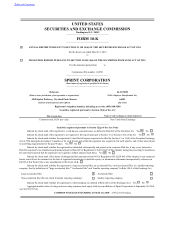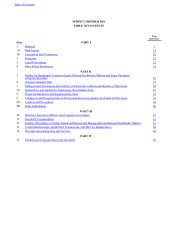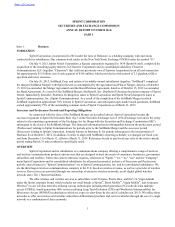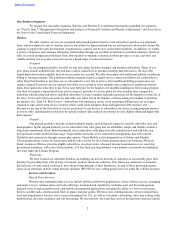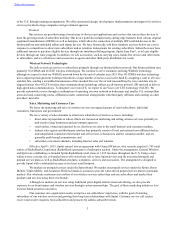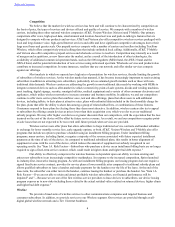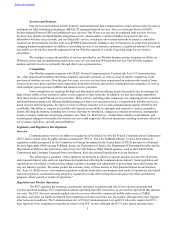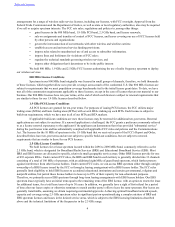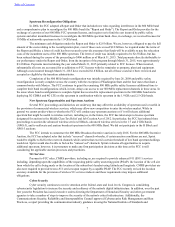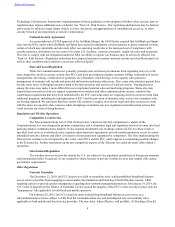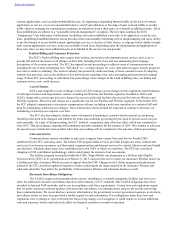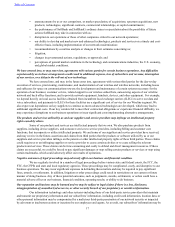Sprint - Nextel 2014 Annual Report Download - page 10
Download and view the complete annual report
Please find page 10 of the 2014 Sprint - Nextel annual report below. You can navigate through the pages in the report by either clicking on the pages listed below, or by using the keyword search tool below to find specific information within the annual report.
Table of Contents
8
Technology Cybersecurity Framework. Implementation of these guidelines or the adoption of further cyber security laws or
regulation may impose additional costs on Sprint. See “Item 1A. Risk Factors—Our reputation and business may be harmed
and we may be subject to legal claims if there is a loss, disclosure, misappropriation of, unauthorized access to, or other
security breach of our proprietary or sensitive information.”
National Security Agreement
As a precondition to CFIUS approval of the SoftBank Merger, the USG Parties required that SoftBank and Sprint
enter into the NSA, under which SoftBank and Sprint have agreed to implement certain measures to protect national security,
certain of which may materially and adversely affect our operating results due to the increased cost of compliance with
security measures, and limits over our control of certain U.S. facilities, contracts, personnel, vendor selection and operations.
If we fail to comply with our obligations under the NSA our ability to operate our business may be adversely affected. See
“Item 1A. Risk Factors—Regulatory authorities have imposed measures to protect national security and classified projects as
well as other conditions that could have an adverse effect on Sprint.”
State and Local Regulation
While the Communications Act generally preempts state and local governments from regulating entry of, or the
rates charged by, wireless carriers, certain state PUCs and local governments regulate customer billing, termination of service
arrangements, advertising, certification of operation, use of handsets when driving, service quality, sales practices,
management of customer call records and protected information and many other areas. Also, some state attorneys general have
become more active in bringing lawsuits related to the sales practices and services of wireless carriers. Varying practices
among the states may make it more difficult for us to implement national sales and marketing programs. States also may
impose their own universal service support requirements on wireless and other communications carriers, similar to the
contribution requirements that have been established by the FCC, and some states are requiring wireless carriers to help fund
additional programs, including the implementation of E911 and the provision of intrastate relay services for consumers who
are hearing impaired. We anticipate that these trends will continue to require us to devote legal and other resources to work
with the states to respond to their concerns while attempting to minimize any new regulation and enforcement actions that
could increase our costs of doing business.
Regulation and Wireline Operations
Competitive Local Service
The Telecommunications Act of 1996 (Telecom Act), which was the first comprehensive update of the
Communications Act, was designed to promote competition, and it eliminated legal and regulatory barriers for entry into local
and long distance communications markets. It also required incumbent local exchange carriers (ILECs) to allow resale of
specified local services at wholesale rates, negotiate interconnection agreements, provide nondiscriminatory access to certain
unbundled network elements and allow co-location of interconnection equipment by competitors. The rules implementing the
Telecom Act continue to be interpreted by the courts, state PUCs and the FCC, and Congress is considering possible changes
to the Telecom Act. Further restrictions on the pro-competitive aspects of the Telecom Act could adversely affect Sprint’s
operations.
International Regulation
The wireline services we provide outside the U.S. are subject to the regulatory jurisdiction of foreign governments
and international bodies. In general, we are required to obtain licenses to provide wireline services and comply with certain
government requirements.
Other Regulations
Network Neutrality
On December 22, 2010, the FCC adopted so-called net neutrality rules, which prohibited broadband Internet
access service providers from engaging in unreasonable discrimination and blocking of lawful Internet content, while
requiring carriers to provide greater transparency regarding their network management practices. On January 14, 2014, the
U.S. Court of Appeals for the District of Columbia Circuit vacated the majority of the FCC’s rules, leaving in place only the
"transparency" rule applicable to both fixed and mobile operators.
On February 26, 2015, the FCC issued an order reclassifying broadband Internet access service as a
telecommunications service subject to Title II of the Communications Act and promulgated new net neutrality rules
applicable to both mobile and fixed service providers. The new rules, when effective, will prohibit: (1) blocking of lawful

